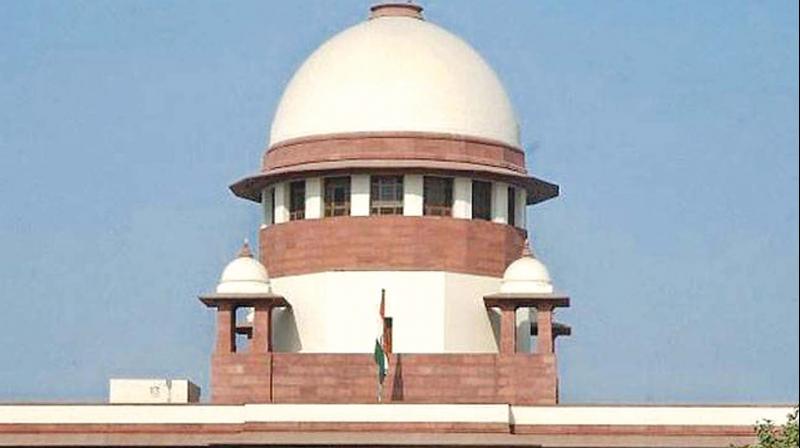Supreme Court modifies BCCI order

New Delhi: The Supreme Court on Thursday modified its October 2016 order, on streamlining the Board of Control for Cricket in India (BCCI) and its direction on ‘one vote for one association’. The court restored the membership of six-state associations—Maharashtra, Mumbai, Vidarbha, Gujarat, Baroda and Saurashtra, Railways, Services and Combined Universities. In terms of the earlier 2016 order these associations had voting rights by rotation.
A three-judge bench of Chief Justice Dipak Misra, Justices A.M. Khanwilkar and D.Y. Chandrachud, however, stuck to some of the key recommendations of the Justice R.M.Lodha disqualifying ministers and those above 70 in terms of the earlier 2016 order these associations had voting rights by rotation. The bench also said the senior, junior and women’s national selection committee would have five members each, instead of three members fixed by the Lodha committee and approved by the apex court in the earlier October 2016 judgment.
Justice Chandrachud who wrote the order said, “We are of the view that it is necessary to restore full membership in the constitution of the BCCI to the three associations each in the State of Maharashtra (Maharashtra, Mumbai and Vidarbha) and in Gujarat (Gujarat, Baroda and Saurashtra). These associations have a long and abiding history of nurturing talent for the game of cricket in India. The history of cricket in India is replete with their contribution to the cause of cricket.”
The court said these associations have produced players who have brought laurels to their states and to the nation. We however, maintain the decision not to grant the status of full members to the National Cricket Club and the Cricket Club of India. Neither of the two Clubs fields teams in the Ranji Trophy. They cannot be placed at par with the other state associations,” Justice Chandrachud writing the judgment said.
The Lodha Committee had recommended that (i) the tenure of each term for office bearers of the BCCI and state associations should be three years; (ii) a maximum of three terms should be allowed regardless of the post held; and (iii) there should be a mandatory ‘cooling off period’ of three years after each term. Cooling off must be accepted as a means to prevent a few individuals from regarding the administration of cricket as a personal turf. The game will be better off without cricketing oligopolies.”
Modifying the earlier order, the bench said “In our view, it would be appropriate to direct that a cooling off period of three years would apply after an individual holds two successive terms in office either in the BCCI, or in any state association or a combination of the two. For instance, if an office bearer has held office for two consecutive terms in any post in a state association, such an individual must face a cooling off period of three years. Likewise, if an individual has held any post as an office bearer of the BCCI for a total period of six years in succession, the individual must have a cooling off period of three years before seeking election again either to the BCCI or to a state association.”
The court clarified that representative from Railways who would exercise voting power must be a former cricketer who has represented Indian Railways and who is elected by an association of former players from the Indian Railways and not a person nominated by the government or the Railway Sports Promotion Board. The Services team represents the Armed Forces of the nation. The Services have a long history of association with Indian sports in general and with cricket as well.”
The court said that having regard to the pre-eminent position occupied by the Services including the Army, Navy and Air Force in propagating the cause of sports and cricket, “we are of the view that the same principle which we have followed in the case of Railways should be followed in their case. Similarly, the Universities are a nucleus for encouraging the game of cricket among players.”
On the composition of selection panel, the court said the Men’s Selection Committee shall consist of five persons to be appointed by a Cricket Advisory Committee comprising of reputed former international cricketers identified by the BCCI at the annual General Meeting, subject to the following criteria: (a) Every member of the Men’s Selection Committee should have played a minimum of (i) Seven Test Matches; or (ii) Thirty First class Matches; or (iii) Ten One Day International Matches and twenty First Class Matches. (b) Every member of the Men’s Selection Committee should have retired from the game at least five years previously. The senior most among the members of the Men’s Selection Committee shall be appointed as the Chairperson
The Junior Cricket Committee shall consist of five persons to be appointed by the BCCI at the Annual General Meeting, on such terms and the Apex Council may decide conditions as from time to time. Only former players who have played a minimum of 25 First Class games shall be eligible to be appointed to this Committee, provided that they have retired from the game at least five years previously. The senior most amongst the members of the Committee shall be appointed as the Chairperson.”
The Women’s Selection Committee shall consist of five persons to be appointed by the BCCI at the Annual General Meeting, on such terms and the Apex council may decide conditions as from time to time. Only former players who have represented the National Team shall be eligible to be appointed to this Committee, provided that they have retired from the game at least five years previously. The senior most international amongst the members of the Committee shall be appointed as the Chairperson.

